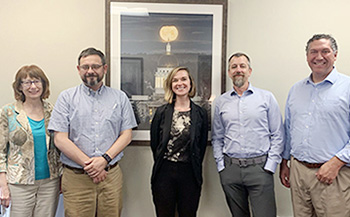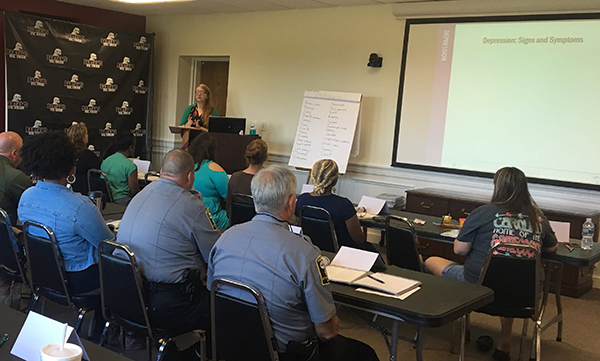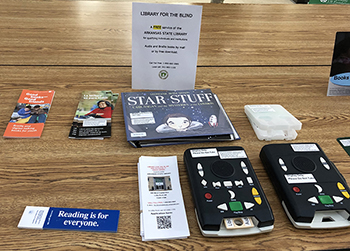Blog Posts | December 30, 2019
Share ThisIMLS on the Road: Trends We Saw in U.S. Public Libraries This Year
Throughout 2019, we visited libraries all across the U.S. Here’s what we learned.
By Madison Bolls, Michele Farrell, and Dennis Nangle

Grants to States: How IMLS Invests in Public Libraries
Each year, public libraries all across the 50 states, the District of Columbia, the U.S. territories of Guam, American Samoa, the Commonwealth of Puerto Rico, the Commonwealth of the Northern Mariana Islands, and the U.S. Virgin Islands, and The Freely Associated States of Federated States of Micronesia, Republic of Palau, and the Republic of the Marshall Islands receive funding from the federal government through IMLS.
With the passage of the FY 2020 budget on December 20, Congress allocated an additional $6 million to the agency’s Library Services and Technology Act (LSTA) Grants to States program, bringing the total funding for public libraries up to $166,803,000. This investment is distributed to each State Library Administrative Agency, based on the population of the state or territory. From there, states use the funding to meet goals for library services outlined in their Five-Year Plans.
Every year, IMLS staff members visit state libraries across the country; each state gets at least one visit every five years. In addition to compliance-related and support conversations, site visits give us the opportunity to see first-hand the federally funded projects being carried out to meet the needs of various communities in that state.
In 2019, the activities, programs, and services that state libraries used IMLS funding for showed the breadth of community needs—and just how libraries are adapting in unique ways for those they serve. Here are three common areas we saw on the library site visit road this past year.

Building Healthy Communities
Libraries can and do serve as vital resources in their communities, and providing people with the information they need to lead healthy lives is no exception. Last year, we saw libraries take on new and different roles to support the health of their patrons and community members—demonstrating leadership and responsiveness to local needs.
The National Institute of Drug Abuse reports that more than 130 people in the United States die every day from opioid overdose. Libraries aren’t usually a place people associate with first responders, but many librarians are seeing people in their communities directly impacted by opioid addiction—and they’re taking action.
Case in point: the Massachusetts Board of Library Commissioners (MBLC), the state library for Massachusetts, held an Opioid Epidemic Symposium at Fort Devens Conference Center in partnership with the Massachusetts National Library of Medicine Center in Worchester. Nearly 140 libraries came together to discuss Narcan—a government-approved, lifesaving nasal spray of naloxone hydrochloride that can stop or reverse the effects of an opioid overdose—and learn how they can better serve members of their community.
We also visited Vermont, where opioid addiction and prevention are being addressed. The Vermont Department of Libraries’ Opioid Overdose Prevention Program provides libraries across the state with policy and procedure recommendations for assisting patrons during a possible overdose. Rutland Free Library, serving nearly 22,000 patrons in rural Vermont, is one of many libraries across the state supporting their community during this public health crisis. Staff received instruction on administering Narcan, and the library has installed Sharps containers in the restrooms to collect used needles. The library director, Randall Mathers, also works with the mayor, police chief, and others so they can all tackle the growing opioid issue together.
Another health issue that libraries are facing is the lack of mental health services in communities. In response, the Union County Carnegie Library in South Carolina is teaching emergency medical technicians, residents, and librarians how and when to notify police or medical personnel when they see someone who might be in need. The eight-hour Mental Health First Aid certification course was adopted from a model developed in Australia and used in 30 other countries, and so far, the library has held five classes with over 75 people receiving the three-year certification. It’s one step along the journey of helping address the needs of the entire community.
Making it Count: Census 2020
Due to the timing of this year’s site visits, Census 2020 was a common topic of conversation, and state libraries are approaching it on both micro and macro scales. The State Library of Iowa’s State Data Center provides critical informational infrastructure for libraries and other agencies in the state. The State Data Center created a 2020 Census page to further assist Iowans in understanding the census and learning how they can participate.
The Missouri State Library has an important role in supporting a successful Census 2020. Their state library is under the Missouri Secretary of State, which enabled State Librarian Robin Westphal to become a member of Missouri’s Complete Count Committee. When asked about her involvement in the census, she elaborated on the value state libraries add to the process.
“Part of what state libraries are bringing to the table on Complete Count Committees is the fact that we represent the most trusted profession at a time when people are skeptical of providing information,” said Westphal. “Our message about the importance and ease of participating in Census 2020 should be during story times, at outreach events, and as library staff are assisting patrons with technology. This is our time to shine the light on the fact that libraries are critical conveyors of information to their communities.”
In Mississippi, it was clear that libraries were approaching Census 2020 from several angles. The state has one of the highest percentages of hard-to-count areas in the country: as of the last census, approximately 27 percent of Mississippi’s current population (804,138 people) live in hard-to-count neighborhoods. Several local libraries had signs and outreach materials that encouraged the community to not only participate in the census, but to also apply for a job as a census taker.

Increasing Access
For hundreds of years, libraries have offered access to critical services and information—but how they do that in 2019 looked very different. At the South Carolina State Library, for example, an Inclusive Service Center teaches library staff and library users how to improve access to information through assistive technology and other resources. The center features an accessible computer with Zoomtext Fusion, scanner, track ball mouse, large print keyboard, power adjustable table, printer, and headphones. An Optelec Clearview desktop magnifier, a Ruby SL HD handheld video magnifier, and ABiSee, a text to speech device, are also made available to library staff so they may become familiar with the equipment and inform those who might need it, as well as their caregivers, friends, and family.
State library staff also developed sample accessibility kits for public libraries on the topics of hearing impairment, visual impairment, dyslexia and other reading disabilities. Books with Braille overlays and a tactile game are also available for libraries to use.
Because resources at public libraries aren’t unlimited, they’ve found creative ways to equip community members with what they need. This year, many libraries demonstrated productive relationships with neighboring libraries and other partners to help share resources across county and city lines.
Maine InfoNet is a collaboration of academic, public, school, and special libraries that promotes online resource sharing, cost effective solutions for quality library information services, and the cultural, educational, and economic development of Maine. It develops and manages services that unite electronic and physical resources, forming a digital library for the entire state.
The Maine State Librarian, along with 12 other members from the Maine library community, make up the board of directors, which guides the planning and establishes policies in a way that works for everyone.
Libraries are also harnessing open and sharable resources to offer greater customization of and access to education. Expensive college course materials can be a barrier for some students—faced with the high price of a textbook, a student may drop out of a course or take the course without the book, at which point their grade could suffer. Recognizing this, East Carolina University and the University of North Carolina at Greensboro worked together to implement an alternative textbook project that ran simultaneously at both institutions.
The universities implemented two ways for faculty to save students money by adopting alternative textbooks: First, they offered mini grants to encourage professors to adjust curricula around free classroom resources, which relied heavily on the use of Open Educational Resources (OERs). Second, they purchased e-book versions of some required texts. This combined approach made it possible for many faculty to lower the cost of required materials for specific classes. Instructors found that not only was it easier for students to access these required texts, but OERs allowed for better tailored and more easily updated course material, which satisfied the professors.
Visits to rural regions also highlighted the need for expanding access to library services and technology. One of the ways libraries are working to support their communities is through public-private partnerships, as is the case with the Charleston Public Library in Arkansas. Earlier IMLS funding through Grants To States helped the library purchase technology and computers. The library can now offer the self-paced learning modules for library users that guide them through the process of applying for jobs online.
This year, we’ve got more states on the docket: Alabama, Alaska, California, Connecticut, Florida, Hawaii, Illinois, Minnesota, Nevada, New Hampshire, Pennsylvania, South Dakota, and Utah. IMLS will also be holding the biannual Grants to States Pacific Workshop to support the territories and freely associated states that receive LSTA funds. We can’t wait to see more of the amazing work being done by libraries in service to their communities in 2020.
About the Authors
Madison Bolls is a Senior Program Officer on the Grants to States team within the Office of Library Services at IMLS. She visited Puerto Rico, the U.S. Virgin Islands, Maine, and North Carolina in 2019. She can be reached at mbolls@imls.gov.
Michele Farrell is a Senior Program Officer on the Grants to States team within the Office of Library Services at IMLS. She visited Colorado, Kentucky, Massachusetts, South Carolina, and Vermont in 2019. She can be reached mfarrell@imls.gov.
Dennis Nangle is a Senior Program Officer on the Grants to States team within the Office of Library Services at IMLS. He visited Arkansas, Delaware, Iowa, Mississippi, and Missouri in 2019. He can be reached at dnangle@imls.gov.
